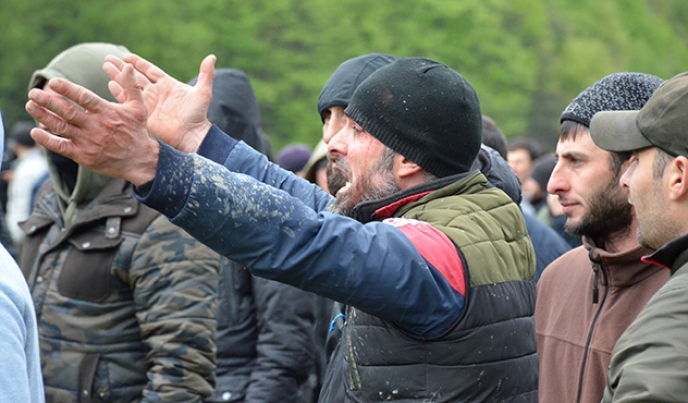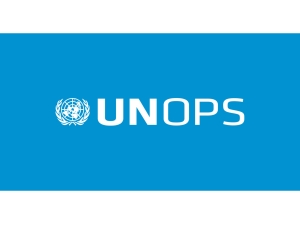More than 300 young residents have left the Pankisi valley between March 28, 2017 and today, since the establishment of the visa-free regime between Georgia and European Union Member States. 300 residents represents a significant part of the Pankisi population, given that according to the last census in 2014, only 6600 people reside in the gorge. Based on the research of the Pankisi Community Radio, between 2017-2018, 121 students have quit school in Pankisi. Most of the young people from the region go to seek asylum or employment in Germany, Denmark, Sweden, Austria, and Finland. At least 30 of the young asylum-seekers from Pankisi have been rejected, and sent back.
Why are young residents of Pankisi leaving Georgia? The Pankisi Community Radio decided to speak to some of the people that have left the gorge.
„What could I do there (in Pankisi)? I finished university three years ago, and I could not get a job anywhere. What can someone do in the gorge? There are no functional factories. Not everyone can open their own family hotel either; there are not enough tourists in the end.“
„The main reasons are unemployment and a widespread sense of injustice. There are no private factories. and you cannot work in the public sector without permission from the State Security Service. You cannot start a business either. My hopelessness became far worse when I noticed that there were no more young people in the neighborhood playing football. So I contemplated for a few months what I could do. Then I left. It’s been a few years since I have left now, and I am still awaiting my citizenship status.“
„The State Security Service shot and killed Temirlan Machalikashvili in his bedroom and then placed a hand grenade in his room to justify shooting him. The fact that something like this happened, and nobody investigated the matter is a significant reason for why so many young people are leaving Pankisi.“
„State policy towards Pankisi is repressive with the existing government, and was repressive with the previous government; there are so many facts that justify this“, Claims Luisa Mutoshvili, and recalls the special operation conducted in the gorge of Lopota.
„In the last 30 years, 21 young Pankisi residents have been killed in the gorge. Killings like this happened during the Shevardnadze government, the Saakashvili government, and they still continue to happen with the existing Georgian Dream Party being in power - the murder of Temirlan Machalikashvili has triggered a wave of aggression in the Pankisi youth.
It was not necessary to conduct this special operation the way it was conducted. The government is trying to unfairly label the Pankisi Gorge as a hotspot for terrorism. There is no reasonable basis to label our community in such a manner“, Khaso Khangoshvili, a member of the Pankisi Council of Elders, told us. According to the Kist elder it is shocking that the Security Service is practically governing Pankisi: “I always say that instead of making use of repressive means, there is much ideological change that could be done here. The youth would be less preoccupied with religion if employment, sports, and education were promoted instead.“
A significant event preceded the murders of 19-year-old Temirlan Machalikashvili, 22-year-old Aslan Margoshvili, and 26-year old Bahauddin Kavtarashvili. In 2005, in the village of Duisi in Pankisi, special forces liquidated Avto Gumashvili and Vakho Gumashvili. According to the police, Avto Gumashvili, who was wanted for wounding a Pankisi resident, engaged in armed resistance during his arrest. However, witnesses claim that Vakho Gumashvili, who was visiting Avto Gumashvili, was signalling his surrender by raising his arms after which he was continuously shot by the special forces. After the shooting, the house caught on fire and both Vakho and Avto died in the fire.
Former Ombudsman, and head of the Democratic Research Institute , Ucha Nanuashvili, claims that none of these serious human rights violations have been investigated. „This unwillingness to investigate creates fertile ground for matters in the region to become worse“, Ucha told us.
„When someone from Tbilisi asks me if he/she needs a passport to enter Pankisi, this is reflective of a serious issue. In different parts of the country, it is widely believed that going to Pankisi is extremely dangerous, and that people walk around armed, ready to kidnap anyone they see,” - Luiza believes that such attitudes stem from the way the government has conducted politics in Pankisi. On the other hand, she claims that such attitudes are also the result of the Pankisi youth participating in the activities of the Islamic State.
„In the past, we used to say that it was extremely important for us to talk about the reasons that ultimately lead some people from Pankisi to the choice to take part in battle operations in Syria. There are many questions that need to be asked. How did some of these young people manage to cross the border when the residents of the gorge fully cooperated with the State Security Service. Many parents of these young people directly sent the private information of their children to the State Security Service, begging them not to let their children cross the border. Though, when a 17-year-old underaged female student was taken from Pankisi to Syria, and was forced to be married to one of the fighters there, the Ministry of Internal Affairs, and the Ministry of Education, despite having full knowledge of this, still let her cross the border. Every government of this country has used the Pankisi Gorge for its own interests.“
34 people from Pankisi have died through involvement in the battles taking place in Syria.
The State Security Service primarily fights radicalization and extremism with the use of force. Based on the experience of other countries facing this issue, politics of force are not an effective means to hinder radicalization in the long term. Force also does not produce satisfying results in terms of prevention.
„Each threat has its determinants. If we are speaking about issues of violent extremism and radicalization, these problems mainly stem from a crisis of social identity and social deprivation. In other words, radicalization happens when people fail to self-actualize in their society, when they are deeply disappointed with the opportunities in their country.
The State Security Service cannot be the only actor responsible for conducting an effective security policy in the country. If we only point towards the security services, we risk omitting other serious factors - religious, social, economic, cultural, and so on - that also contribute to insecurity. The State Security Service can only be reactive through its existing force-based methodology in its prevention of radicalization; however, it is necessary to be preventive instead of reactive“, - claims Giorgi Gobronidze, an expert in international relations, who is one of the authors of the study on improving the existing mechanisms of dealing with radicalization and violent extremism in Georgia. The study also reviews international experience with tackling radicalization and violent extremism.
The United Kingdom is one of the European countries actively facing the issue of violent extremism. The key approach of the UK policy to counter violent extremism focuses on prevention. The government conducts a number of programs aimed towards minimizing the possibility of UK citizens becoming supportive of terrorism. The UK’s existing policy of prevention stems from previous failed attempts of stopping radicalization through force-based and punitive means.
The government of the Netherlands uses as a multidisciplinary approach for countering violent extremism. The Dutch approach entails developing an individual action plan from people who show signs of becoming radicalized. Local municipalities, the National Coordinator for Security and Counterterrorism, the police, child security services, the education sector, and community leaders all collaborate in the attempt to implement an effective strategy for countering radicalization and violent extremism.
In the Netherlands, the state also invests in rehabilitating former extremists. The government views repressive means, such as arrest and prosecution as a last resort, for cases in which the preventive means described above cannot produce acceptable results. When it comes to foreign fighters returning to the Netherlands, they undergo a threat evaluation test. Following the test, some of the fighters are prosecuted, while some are placed in the national rehabilitation program.
The German government also employs a preventive approach. The so called, „EXIT program“, offers informal education and employment for individuals wishing to distance themselves from radical groups.
The National Strategy of Georgia on Fight against Terrorism was approved on January 23, 2019, according to Resolution N53 of the Georgian government. Before the adoption of the resolution, Georgia did not have a strategic document pertaining to this matter. However, in 2014, the punitive legislation concerning violent extremism became stricter. The criminal code expanded to include Article 323/part 2, according to which “participation in international terrorism, and/or military support to a foreign country or the authorities thereof, to a group of persons or to other physical or legal persons, committed for terrorist purposes, - shall be punished by imprisonment for a term of twelve to seventeen years.” The Criminal Code also includes the addition of Article 327/part 1, according to which “recruiting a person as a member of a terrorist organisation or for carrying out terrorist activities, - shall be punished by imprisonment for a term of five to ten years.” A number of Georgian citizens are currently serving sentences for participating in the activities of the Islamic State, and for supporting and recruiting members for the terrorist organization. Some of them were arrested immediately upon their return to Georgia.
The National Strategy of Georgia on Fight against Terrorism is based on seven basic directions: (I)collection of terrorism-related information, (II)prevention, (III)protection, (IV)preparedness, (V)prosecution, (VI)development of legislative framework, and (VII)international cooperation. There are no government programs in Georgia as of today aimed towards countering violent extremism; there is also no rehabilitation program targeting fighters returning from Syria.
„A key obstacle is the dominant mindset about the people from Pankisi, which consistently marks them as an extremely dangerous and risky group to deal with. For years, such a view has informed government policy over the Pankisi Gorge. This policy is mostly based on repression and punitive measures.
The second obstacle is the welfare in Pankisi - social problems, low employment chances, and high migration. We witness the depopulation facing Pankisi on a daily basis. Naturally, besides the social and economic determinants of depopulation, the locals are disappointed with the events that have taken place in Pankisi in the last few years. The murder of Temirlan Machalikashvili, the construction of hydroelectric plants that are making drinking water in Pankisi scarcer than ever before, and the massive police operation conducted in Pankisi after locals protested the construction of the hydroelectric plants - these are all recent events that give the people of Pankisi a constant sense of insecurity. In the existing political system, Pankisi residents feel as if they are second-class citizens. Social discontent is the most widespread in the Pankisi Gorge“, - claims Tamta Mikeladze, a lawyer, and the program director of the Equality Policy at the Human Rights Education and Monitoring Center.
According to Tamta, the Georgian government is attempting to create the illusion that it is resolving the pressing issues of Pankisi. Tamta pointed to the 2019-2020 Pankisi Gorge Development Action Plan that was created by the office of the State Minister for Reconciliation and Civic Equality: “The plan is inherently weak. It includes various activities, which are already implemented in the Gorge by the state. On the one hand it is not based on surveying the needs of the locals, and on the other hand, it is mainly oriented towards infrastructural projects. The plan is less focused on welfare programs and social protection – greater support for education, superior employment opportunities, etc...”
EMC recommends that the Government of Georgia base its security policy on social justice and human rights. This would include increasing the role of the Ministries of Education, Healthcare, Economics and Reconciliation in the Pankisi Gorge.


 LIVE
LIVE








